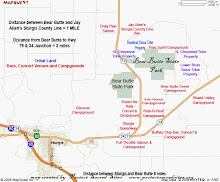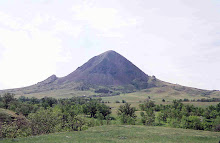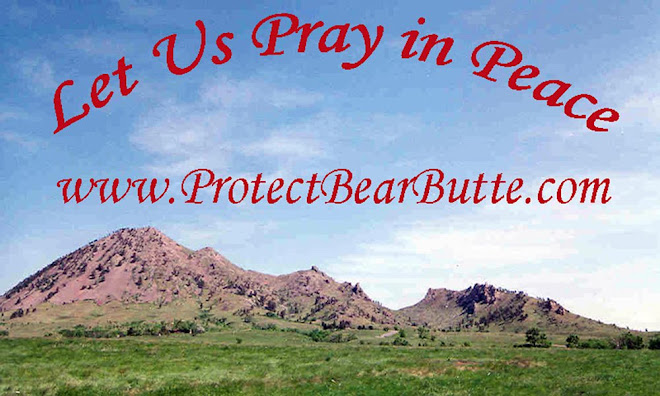Kari Lydersen: Bikers and Bear Butte
Tuesday, June 27 2006 @ 11:12 AM PDT
Contributed by: Admin
Views: 1,384
In 1857, 30,000 Sioux and Cheyenne gathered at Bear Butte in South Dakota to plan how to deal with white settlers moving in on their sacred land. Native American warriors launched attacks on wagon trains from the mountain, incidents which are now commemorated in historical plaques along the highway. In 1874, Indian fighter George Custer visited Bear Butte, two years before making his infamous "last stand" at Little Bighorn. Chief Crazy Horse also spoke there, calling on his people never to sell the land.
Bikers and Bear Butte
By Kari Lydersen
Infoshop News (news.infoshop.org)
June 27, 2006
In 1857, 30,000 Sioux and Cheyenne gathered at Bear Butte in South Dakota to plan how to deal with white settlers moving in on their sacred land. Native American warriors launched attacks on wagon trains from the mountain, incidents which are now commemorated in historical plaques along the highway. In 1874, Indian fighter George Custer visited Bear Butte, two years before making his infamous "last stand" at Little Bighorn. Chief Crazy Horse also spoke there, calling on his people never to sell the land.
The windswept mountain is sacred to about 30 regional Native American tribes, a spiritual respite for vision quests, healing, learning and praying. And they are still fighting to defend it from white men. Now instead of pioneers in covered wagons, their nemesis is a biker turned developer who is proposing one of the world’s largest biker bars at the foot of Bear Butte.
For about two weeks every summer, the stark hills and mesas of Bear Butte rise above an incongruous backdrop: hundreds of thousands of bikers from around the US and Europe attending the annual Sturgis Motorcycle Rally. Bikers camp at the Buffalo Chip campground about four miles from the mountain, drink beer and cheer rock groups like Lynyrd Skynyrd.
Native Americans in the area are offended by the drinking and debauchery at the foot of their sacred mountain, but they have grudgingly tolerated the motorcycle rally for the about 60 years it has been going on. Now they are furious that an Arizona biker and developer wants to turn the biker party scene into a year-round presence, with a sprawling biker bar and campground within two miles of Bear Butte on it’s currently undeveloped north side.
"We’re trying to defend this mountain that’s sacred to our people for many generations, but we’re fighting against millionaire developers," said Victorio Camp, 31, a Pine Ridge reservation resident who grew up doing vision quests at Bear Butte. "This mountain is a place where spirituality comes from. It’s a place where we gather medicines and do ceremonies. It’s hard to go up there and pray when you have 100,000 motorcycles driving by."
Developer Jay Allen started out as a participant and leather vendor at the Sturgis rally. He was a regular at the Broken Spoke Saloon in a former Sturgis lumberyard. He ended up buying the bar in 1993, and then opened a chain of Broken Spokes in Florida, New Hampshire and South Carolina. For his new 600-acre development, he made clumsy efforts to reach out to Native Americans. He announced plans to call the complex "Sacred Ground," and feature an 80-foot statue of an Indian, a tipi village and an "educational center" about Native Americans – many bikers do feel an affinity with Native Americans and want to learn more about their culture. (Some bikers also oppose Allen’s development, and testified against his application for a liquor license at a public hearing.)
Local tribes did not appreciate Allen’s gesture, however, seeing it as a case of adding insult to injury, especially considering the history of the area.
Bear Butte is part of the Black Hills which the Lakota feel were stolen from them by the US government after the Treaty of Ft. Laramie in 1868. In 1923 they filed a lawsuit charging the land was seized without just compensation, and the suit slowly made its way through the courts all the way up to a US Supreme Court decision in 1980 in which the Justices upheld a lower court decision awarding the Lakota more than $100 million for the land. Tribes have refused to accept the money, instead continuing to demand that the land be returned.
Last fall the foundation was laid for Allen’s 22,500 foot bar, a huge asphalt parking lot and a 30,000-person-plus music venue he has said will serve "the biggest music acts known to mankind." (Allen could not be reached for comment, and Sturgis rally organizers declined to comment).
Meanwhile another developer has applied for permits for another bar and campground nearby. And venues for the summer rally have encroached closer and closer to the mountain, which is mostly a state park with areas reserved for Native ceremonies. Defenders of Bear Butte are calling for at least a five mile buffer zone between the mountain and new development.
Organizers of the Sturgis biker rally, which is no doubt a crucial part of the working class town’s economy, declined to comment on the biker bar plans. A county commissioner said that since Allen owns the land and his plans meet local codes, there is no reason for the government to interfere.
Camp is particularly concerned that the development is on the north of Bear Butte, whereas the rally festivities are mainly on the opposite side around downtown Sturgis.
"All this traffic from Sturgis will be coming by now," he said. "We’re worried about the animals, the wildlife."
Native Americans also don’t like the fact that drinking alcohol will be allowed and probably rampant at the music venue and campground.
"They’ll all be drunk, looking at our mountain, and they won’t see it as such a beautiful, pure place; they don’t know the majesticness and power the place has," said Camp. "They walk around naked and drink and ride bikes; to us that’s very disrespectful."
"You wouldn’t have this in front of a church, synagogue or hospital," added Lakota activist Debra White Plume. "That’s what Bear Butte is like to us."
Different tribes have formed the Bear Butte International Alliance to oppose the development, and petitioned the county to put Allen’s liquor license up for a county-wide vote. (Their request was denied). In late spring, 27 Cheyenne teenagers ran a two-day, 190-mile relay from their reservation in Montana to Bear Butte in protest. Tribal members plan to keep fighting Allen’s plan and other development proposals in various ways. Within the past few years their lobbying has helped defeat other development proposals, including a shooting range.
"We just want to hold on to what little we have left at this mountain," said Camp. "As Lakota it is our duty to protect the earth. We’re just trying to have people understand why it’s such a sacred place. But it feels like our rights are being stepped on again, the same thing that’s been happening since Columbus came."
Native Americans from around the country will come to Bear Butte in August for a summit on protecting sacred sites. White Plume said they are planning protest actions in Sturgis, and they plan to contact musicians who have played or might consider playing at the rally or new arena.
"We see it as a desecration not only of a mountain but of our way of life," she said. "This is a genocidal issue to us. If they kill this mountain, they kill our way of life."
---------
Kari Lydersen is a freelance writer whose work has appeared in the Washington Post, In These Times, LiP Magazine, Clamor, and The New Standard.
http://www.infoshop.org/inews/article.php?story=2006bear_butte
Tuesday, June 27, 2006
Subscribe to:
Post Comments (Atom)




No comments:
Post a Comment